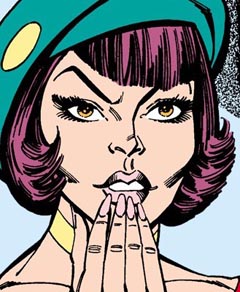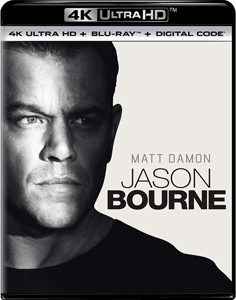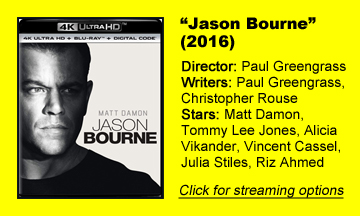From Jan. 6-14, we’re looking back at the five films of the “Bourne” series, so prepare to have your memory refreshed. Next up is the fifth film, “Jason Bourne” (2016):
Screenwriters Paul Greengrass and Christopher Rouse stand on the shoulders of Tony Gilroy (writer of the first four movies) and Robert Ludlum (creator of the character) in “Jason Bourne.” With the duo also resuming their regular duties – Greengrass as director, Rouse as editor – the familiar style of blue-lit command rooms, world-hopping and fist- and street-based action is in place.
Finally, the background
But this is an unusual capper to the five-film saga in that we get Bourne’s (Matt Damon) background at the end.
The “Bourne” trilogy (2002-07) had kept answers and characterization at arm’s length on purpose; most strikingly to my mind, Julia Stiles is in a top-billed role as a Treadstone tech agent but doesn’t have much to do.
“Jason Bourne” is a conscious response to that right off the bat as Nicky’s downloading of files on yet another US black ops program – this one called Iron Hand – again puts the CIA on Bourne’s trail. Nicky is more in on the action here, but I’m disappointed we don’t learn about her relationship with Bourne (if any) before his amnesia.
In this first “Bourne” film not adapted from a novel, Greengrass and Rouse fall into formula, which is perhaps inevitable in the fifth film in a franchise.
We quickly realize Tommy Lee Jones’ CIA director Robert Dewey is the new version of Brian Cox’s and David Strathairn’s characters, and Alicia Vikander’s Heather Lee is the answer to Joan Allen’s Pamela Landy.
Jones has just the right amount of slime dripping from him, and Vikander (“Ex Machina,” “Tomb Raider”) is striking because she is so seemingly young for the role – appearing to be about 15 but with a deep, mature voice. (The actress was 27 when the film came out.)
The most topical ‘Bourne’
With so much of “JB” being about digital communication, metadata and the spy state controversy, it’s intriguing in an understated way to see old Dewey and young Heather duke it out. She sneaks a text message to help out Bourne.
And yet Dewey didn’t rise to his position through idiocy: He approves but then hijacks Heather’s mission to bring in Bourne, using his personal agent (Vincent Cassel’s “The Asset”) to kill Heather’s men and attempt to kill Bourne.
This is the most topical of the “Bourne” films, but I don’t think it will remain stuck in its time. It hit cinemas at the pivot point (“Snowden” also came out in 2016) when the public examined whether it’s worth giving up privacy for the illusion of safety.
That answer seems to have been settled since then – with the alphabet agencies firmly entrenched — so in the future “JB” will serve as an important slice of history for young viewers who grow up in a post-privacy world.

It’s always going to be slightly clunky to dramatize a pivotal question like this – which, honestly, is decided in the dark halls of deep government more so than at the ballot box or in ongoing conversations – so I give “JB” a pass for its melodrama.
Aaron Kalloor (Riz Ahmed, who plays a nastier type of corporate magnate in “Venom”) is the head of a Facebook-style site, but he’s having moral doubts about his backroom dealings with Dewey. This all comes to a head at a conference speech where he’s poised to spill the beans to the public but The Asset is poised to take him out.
Tired in spirit
Being older and grayer serves Damon well in “JB.” Although Bourne does more hand-to-hand fighting than ever before – indeed, he’s in “Rambo III” fighting-for-cash territory at the start – he’s tired in this one.
Not physically tired, but tired in spirit: He desires answers, once and for all. His amnesia is mostly gone now, so he has turned his attention to the roots of Treadstone and its program of turning soldiers into unquestioning assassins.
Bourne is never as likable in the sequels as he is in “The Bourne Identity” (2002). (For an actor so good at comedy, it’s remarkable how humorless the “Bournes” are.)
But the picture we get of this man with a highly unusual career path rings true. At the end of the day, Bourne is an individual, and he’s essentially fighting to retain that status throughout his four films.
“Jason Bourne” might be the bluntest of the four, but it’s also the most grippingly relevant, because government programs that know what everyone is doing all the time ultimately threaten to wipe out individualism.
With this series capper, Jason Bourne now represents an ideal that’s more spotlighted than it was in 2002.


